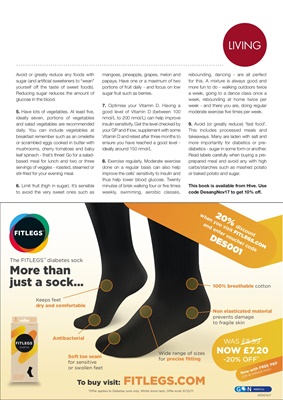
KITLIVING
Keeps feet
dry and comfortable
100% breathable cotton
Antibacterial
The FITLEGS™ diabetes sock
Wide range of sizes
for precise fitting
*Offer applies to Diabetes sock only. Whilst stock lasts. Offer ends 31/12/17.
Non elasticated material
prevents damage
to fragile skin
Soft toe seam
for sensitive
or swollen feet
To buy visit: FITLEGS.COM
WAS £8.99
Now with FREE P&P
(UK & Ireland only)
-20% OFF*
NOW £7.20
More than
just a sock...
20%
DES001
discount
when you visit FITLEGS.COM
and enter voucher code
400014/1
Avoid or greatly reduce any foods with
sugar (and artificial sweeteners to "wean"
yourself off the taste of sweet foods).
Reducing sugar reduces the amount of
glucose in the blood.
5. Have lots of vegetables. At least five,
ideally seven, portions of vegetables
and salad vegetables are recommended
daily. You can include vegetables at
breakfast remember such as an omelette
or scrambled eggs cooked in butter with
mushrooms, cherry tomatoes and baby
leaf spinach - that's three! Go for a saladbased
meal for lunch and two or three
servings of veggies - roasted, steamed or
stir-fried for your evening meal.
6. Limit fruit (high in sugar). It's sensible
to avoid the very sweet ones such as
mangoes, pineapple, grapes, melon and
papaya. Have one or a maximum of two
portions of fruit daily - and focus on low
sugar fruit such as berries.
7. Optimise your Vitamin D. Having a
good level of Vitamin D (between 100
nmol/L to 200 nmol/L) can help improve
insulin sensitivity. Get the level checked by
your GP and if low, supplement with some
Vitamin D and retest after three months to
ensure you have reached a good level -
ideally around 150 nmol/L
8. Exercise regularly. Moderate exercise
done on a regular basis can also help
improve the cells' sensitivity to insulin and
thus help lower blood glucose. Twenty
minutes of brisk walking four or five times
weekly, swimming, aerobic classes,
rebounding, dancing - are all perfect
for this. A mixture is always good and
more fun to do - walking outdoors twice
a week, going to a dance class once a
week, rebounding at home twice per
week - and there you are, doing regular
moderate exercise five times per week.
9. Avoid (or greatly reduce) 'fast food'.
This includes processed meals and
takeaways. Many are laden with salt and
more importantly for diabetics or prediabetics -
sugar in some form or another.
Read labels carefully when buying a preprepared
meal and avoid any with high
carbs/starches such as mashed potato
or baked potato and sugar.
This book is available from Hive. Use
code DesangNov17 to get 10% off.